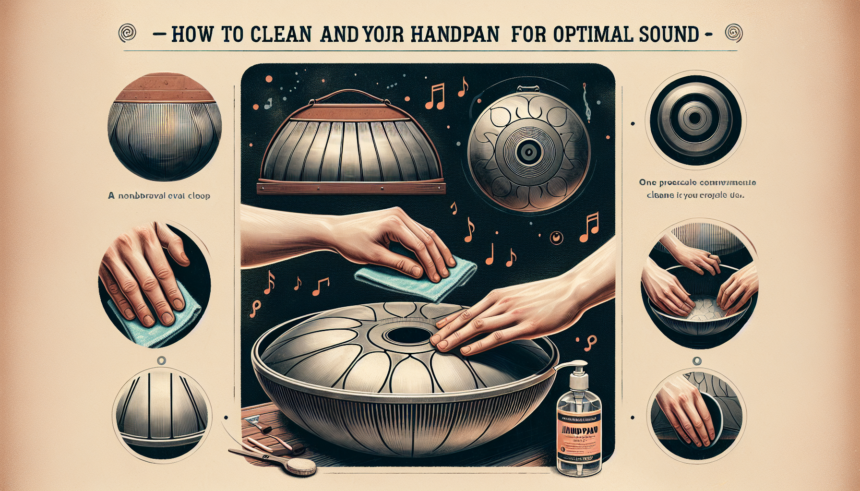<!DOCTYPE html>
<html lang="en">
<head>
<meta charset="UTF-8">
<meta name="viewport" content="width=device-width, initial-scale=1.0">
<title>How to Clean and Store Your Handpan for Optimal Sound</title>
<style>
body {
font-family: Arial, sans-serif;
line-height: 1.6;
margin: 20px;
background-color: #f4f4f4;
}
h2 {
color: #333;
}
.faq {
margin-top: 20px;
}
.faq h3 {
margin-bottom: 10px;
color: #0056b3;
}
</style>
</head>
<body>
<h2>Caring for Your Handpan: Cleaning and Storage Techniques</h2>
<p>
Handpans are unique and beautiful musical instruments that produce a rich, melodic sound. Proper care is essential for maintaining the optimal sound and longevity of the instrument. This article will guide you through the best practices for cleaning and storing your handpan to ensure it continues to produce beautiful music for years to come.
</p>
<h2>Cleaning Your Handpan</h2>
<p>
Regular cleaning is crucial for maintaining the performance and appearance of your handpan. Various factors such as the environment, playing frequency, and handpan material will determine the specific cleaning requirements. However, here are some general steps to help you get started:
</p>
<h3>Materials You'll Need:</h3>
<ul>
<li>Soft microfiber cloth</li>
<li>Mild soap or handpan-specific cleaner</li>
<li>Distilled water</li>
<li>90% Isopropyl alcohol (optional)</li>
<li>Protective oil (such as Phoenix oil or Frogs Lube)</li>
<li>Paper towels or clean, dry cloth</li>
</ul>
<h3>Step-by-Step Cleaning Instructions:</h3>
<h3>1. Remove Dust and Debris:</h3>
<p>
Before applying any cleaning product, use a soft microfiber cloth to gently remove any dust and debris from the surface of the handpan. Make sure to cover all areas, including the notes, dimples, and bottom sides.
</p>
<h3>2. Clean with Mild Soap and Water:</h3>
<p>
If your handpan is particularly dirty, mix a small amount of mild soap with distilled water. Lightly dampen the microfiber cloth with the soapy water and gently wipe down the instrument's surface. Avoid using excess water, especially if your handpan has any open seams or joints.
</p>
<h3>3. Rinse and Dry:</h3>
<p>
Dampen another cloth with distilled water to rinse off any soap residue. Once the soap is thoroughly rinsed, use a dry microfiber cloth or paper towels to gently dry the surface. Ensure the handpan is completely dry before proceeding to the next step.
</p>
<h3>4. Disinfection (Optional):</h3>
<p>
If you wish to disinfect your handpan, especially if it is shared among multiple players, lightly dampen a clean cloth with 90% isopropyl alcohol and wipe down the surface. This step is optional but can help to remove germs and bacteria.
</p>
<h3>5. Apply Protective Oil:</h3>
<p>
Once your handpan is clean and dry, it’s important to apply a protective oil to prevent rust and corrosion. Use only handpan-specific oils such as Phoenix oil or Frogs Lube.
<ol>
<li>Apply a small amount of oil to a clean microfiber cloth.</li>
<li>Gently rub the oil onto the entire surface of the handpan, including the underside.</li>
<li>Allow the oil to sit for a few minutes to be absorbed.</li>
<li>Using a dry cloth, wipe off any excess oil to avoid a sticky residue.</li>
</ol>
</p>
<h2>Storing Your Handpan</h2>
<p>
Storing your handpan properly is equally as important as cleaning it. Improper storage can lead to damage, affecting both the instrument's aesthetic and sound quality. Follow these guidelines for optimal storage:
</p>
<h3>1. Find a Suitable Storage Environment:</h3>
<p>
Handpans react to changes in temperature and humidity. To prevent damage:
<ul>
<li><strong>Temperature:</strong> Store your handpan in a room with stable temperature, ideally between 60-75°F (15-24°C). Avoid exposing the instrument to extreme temperatures or direct sunlight.</li>
<li><strong>Humidity:</strong> Aim for a humidity level between 40-60%. Avoid storing your handpan in overly damp or dry environments. A humidifier or dehumidifier can help regulate the room's humidity.</li>
</ul>
</p>
<h3>2. Use a Soft Case or Hard Case:</h3>
<p>
Investing in a quality handpan case is essential for protection. Soft cases provide convenience and lightweight protection for daily use, whereas hard cases offer more robust protection during travel or storage. Ensure the case fits snugly without putting pressure on the handpan’s notes.
</p>
<h3>3. Avoid Stacking or Pressure:</h3>
<p>
Never stack other objects on top of your handpan, as this can cause deformation and detuning. Additionally, avoid placing heavy items inside the case with your handpan. Always store the instrument flat with no pressure on its surface.
</p>
<h3>4. Regularly Check for Signs of Rust and Wear:</h3>
<p>
Even with proper storage, it’s important to periodically check your handpan for any signs of rust or wear. If you detect any rust spots, address them immediately with a gentle cleaning, followed by applying a protective oil.
</p>
<h2>Conclusion</h2>
<p>
Maintaining your handpan through proper cleaning and storage methods is essential for preserving its beauty and sound quality. A well-cared-for handpan can provide years of musical enjoyment. Regularly clean your handpan with suitable materials, store it in a stable environment, and protect it from physical damage. By following these guidelines, you can ensure your handpan remains in excellent condition and continues to produce its enchanting melodies.
</p>
<h2>FAQs</h2>
<div class="faq">
<h3>1. How often should I clean my handpan?</h3>
<p>It's recommended to clean your handpan at least once every 1-2 months, depending on how often you play it and the environment where it's kept.</p>
</div>
<div class="faq">
<h3>2. Can I use regular household cleaning products on my handpan?</h3>
<p>No, avoid using harsh chemicals or household cleaning products as they can damage the protective coating and the metal. Use only mild soap or handpan-specific cleaning solutions.</p>
</div>
<div class="faq">
<h3>3. What should I do if my handpan gets rust spots?</h3>
<p>If you notice rust spots, gently clean the affected area with a cloth and water, dry it thoroughly, and apply a protective oil. If the rust is significant, consult a professional for advice.</p>
</div>
<div class="faq">
<h3>4. Is it necessary to oil my handpan after every cleaning?</h3>
<p>Yes, applying a protective oil after each cleaning helps to prevent rust and corrosion, ensuring that your handpan remains in good condition.</p>
</div>
<div class="faq">
<h3>5. Can I store my handpan in a basement or garage?</h3>
<p>It's best to avoid storing your handpan in locations with high humidity or temperature fluctuations, like basements or garages. Opt for a stable room environment within your home.</p>
</div>
</body>
</html>How to Clean and Store Your Handpan for Optimal Sound

Leave a comment




